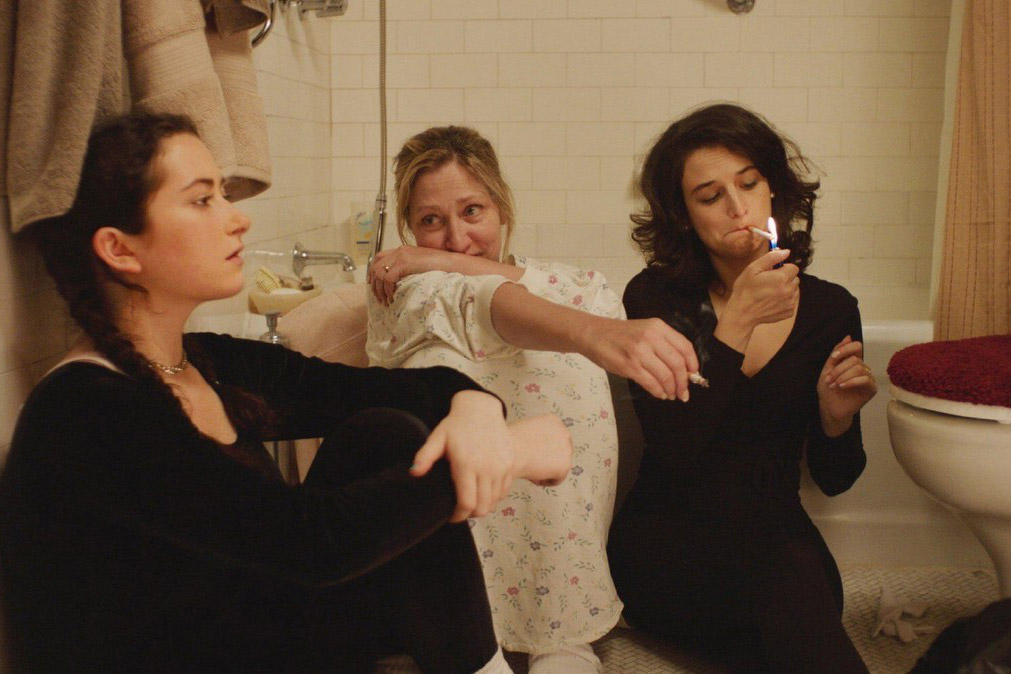About 20 or 30 minutes into writer-director Gillian Robespierre’s new film Landline, I started tearing up, and I continued tearing up intermittently throughout the rest of the movie. Quiet, sniffly, sometimes giggly tears, the kind that leak unexpectedly from the far corner of your eye and that you wipe off with a shirtsleeve pinched between your forefinger and thumb.
I was crying not because I was sad — though the movie certainly contains moments of sadness — but rather because I was completely immersed in the messy human drama on screen, so authentically and artistically rendered that it completely suspended my inner critic. I love when that happens, rare as it is. It’s why I go to the movies.
There is absolutely nothing new or remarkable about the outward trappings of Landline, a familiar familial dramedy about a pair of smart, liberal Manhattanites (John Turturro and Edie Falco) trapped in a stale if comfortable (or vice versa) marriage, and their two daughters: Dana (Jenny Slate), about to be married to the milquetoast hipster Ben (Jay Duplass), and Ali (Abby Quinn), a whip-smart teenager who dabbles in heroin and reacts viciously, and hilariously, to her family’s staid hypocrisies.
As the strangely fetishistic title suggests, the film is set in 1995, just before the digital dawn of the dirty laundry age, when a bunch of people riding in a car together actually had to either talk or sit in awkward silence. In this sense, the film is a subtle jab at our present ridiculousness, when the slightest personal crisis is a reason to hang your whiner flag on social media.
It would be a mistake, however, to think that Landline can be defined solely by its mid-’90s era (which it nonetheless renders with an accuracy that puts a one-dimensional movie like Singles to shame). There is a timeless quality to the way Robespierre captures a family in freefall, in moments of rich and complex emotion that are rendered with a pitch-perfect balance of pathos and bathos. There really isn’t a false note in the movie.
Of course, Robespierre is aided by a dream cast that just happens to be perfectly matched, one to the other and altogether. Turturro, always an expert at capturing the shambling melancholy of masculine failure, is fantastic as a husband whose infidelity is indiscernible from a cry for help, and Falco brings a furious vulnerability in the role of a proud, pinched control freak on the verge of complete implosion.
Slate is equally captivating as the good girl who, mirroring her father’s romantic crimes, indulges in an affair that sends her life off the rails, in surprising ways, and Duplass is appropriately doughy as her lovably tame fiancé, the kind of guy who treats sex like a polite transaction of recessive favors.
In a sense, though, the film belongs to Quinn, who practically crackles on screen; she is the moral and emotional barometer of this film, a kid wise beyond her years but self-burdened with holding her family together. The chemistry she and Slate share on screen, as two sisters reconnecting in crisis, is the beating heart of this film.
Though small in scale and reach, Landline contains disarming emotional depths; its laughs are honestly earned, and its fully fleshed, fallible but lovable characters, ever slouching toward some kind of redemption, are rendered with an honesty and intimacy that is too rare these days. The film ends on an ambiguously upbeat note that is wonderfully in keeping with the tolerance and forgiveness it displays toward each of its flawed characters — a kind of grace through flailing. (Broadway Metro)
